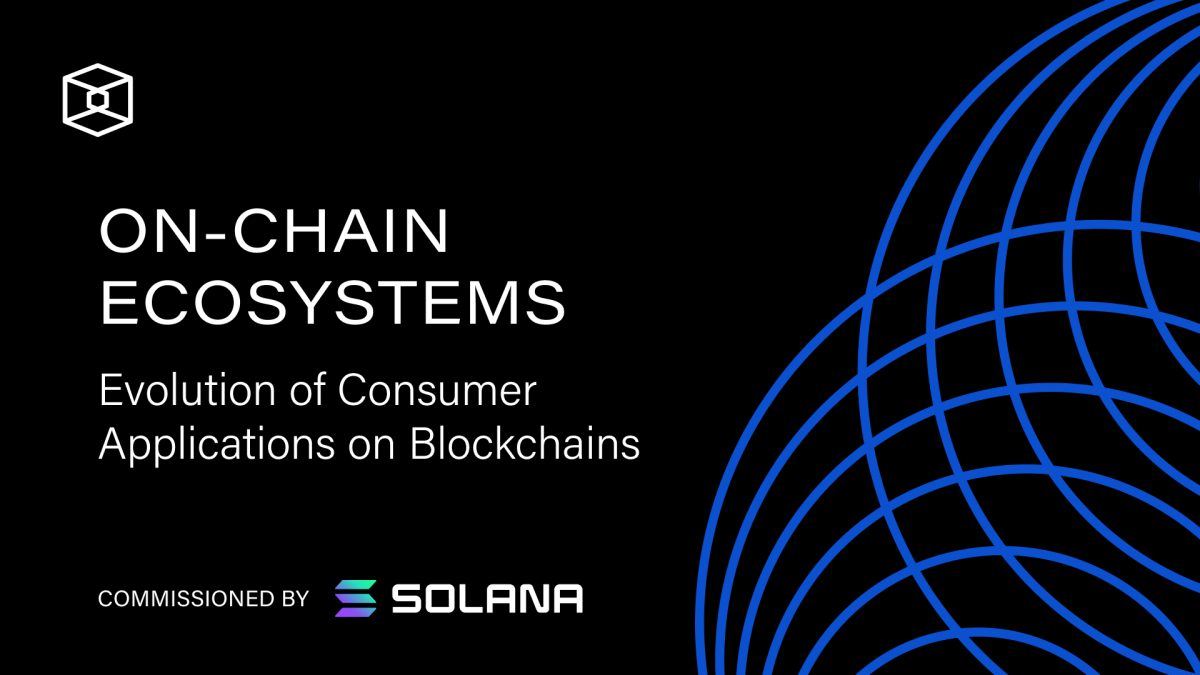On-Chain Ecosystems: Evolution of Consumer Application on Blockchains

The Block Research has created “On-Chain Ecosystems: Evolution of Consumer Application on Blockchains” presented by Solana & Solana Foundation. To access the full report in PDF format, please fill out the form below:

In the past few years, blockchains have undergone a dramatic transformation from their origins as simple ledgers for digital currency transactions to sophisticated platforms supporting a myriad of consumer applications. In particular, the emergence of smart contracts, first introduced on Ethereum in 2015, has catalyzed a broad spectrum of on-chain activities that extend far beyond peer-to-peer transactions. This report delves into the evolution of consumer applications on blockchains, highlighting the critical factors driving their development and adoption.
First, we take a look at the pioneering role of stablecoins in tokenizing financial value on the blockchain, which lay the foundation for some of the earliest on-chain consumer apps to bring novel, tangible utility to crypto users. We explore the ways in which decentralized finance (DeFi) protocols began to tokenize ever-more complex forms of value in a composable manner, enabling an entire sector of decentralized financial services on chain, including lending, borrowing, trading, yield generation, and more. In many respects, DeFi protocols represent some of the first on-chain consumer apps to achieve product-market fit, fundamentally altering the way users interact with blockchains and continuing to serve as a driving force for on-chain activity today.
Over time, the DeFi landscape and its production of newfound revenue opportunities have become increasingly competitive. The industry’s relentless pursuit of user liquidity and attention through incremental innovation and token incentives has created an environment that is becoming more adversarial for all participants. DeFi users today often confront unpredictable security risks when interacting with new protocols, while developers are forced to compete for increasingly fragmented, mercenary, and value- extractive capital. This environment, combined with persistent regulatory hostility from government agencies, has steadily reduced the scale of public investment opportunities in favor of private markets in recent years. Meanwhile, consumer loyalty towards protocols has naturally declined as a result of these combined factors as well.
In this report, we explore the unique ways in which DeFi protocols have been able to adapt to these conditions and maintain a competitive advantage. In some cases, protocols that effectively leverage the properties of specific blockchains have enjoyed sustained market dominance, while others have found success by moving between chains at strategic moments. This report also looks forward to the future of on-chain consumer apps. Emerging trends point towards greater integration with existing Web2 infrastructure, improved user experience, and bespoke approaches to fostering social interactions and user loyalty. As blockchains continue to grow and become more scalable, on-chain consumer apps and the wide range of possibilities they entail are now poised to have a greater influence on the broader crypto experience than ever before.
Disclaimer: The Block is an independent media outlet that delivers news, research, and data. As of November 2023, Foresight Ventures is a majority investor of The Block. Foresight Ventures invests in other companies in the crypto space. Crypto exchange Bitget is an anchor LP for Foresight Ventures. The Block continues to operate independently to deliver objective, impactful, and timely information about the crypto industry. Here are our current financial disclosures.
© 2025 The Block. All Rights Reserved. This article is provided for informational purposes only. It is not offered or intended to be used as legal, tax, investment, financial, or other advice.







